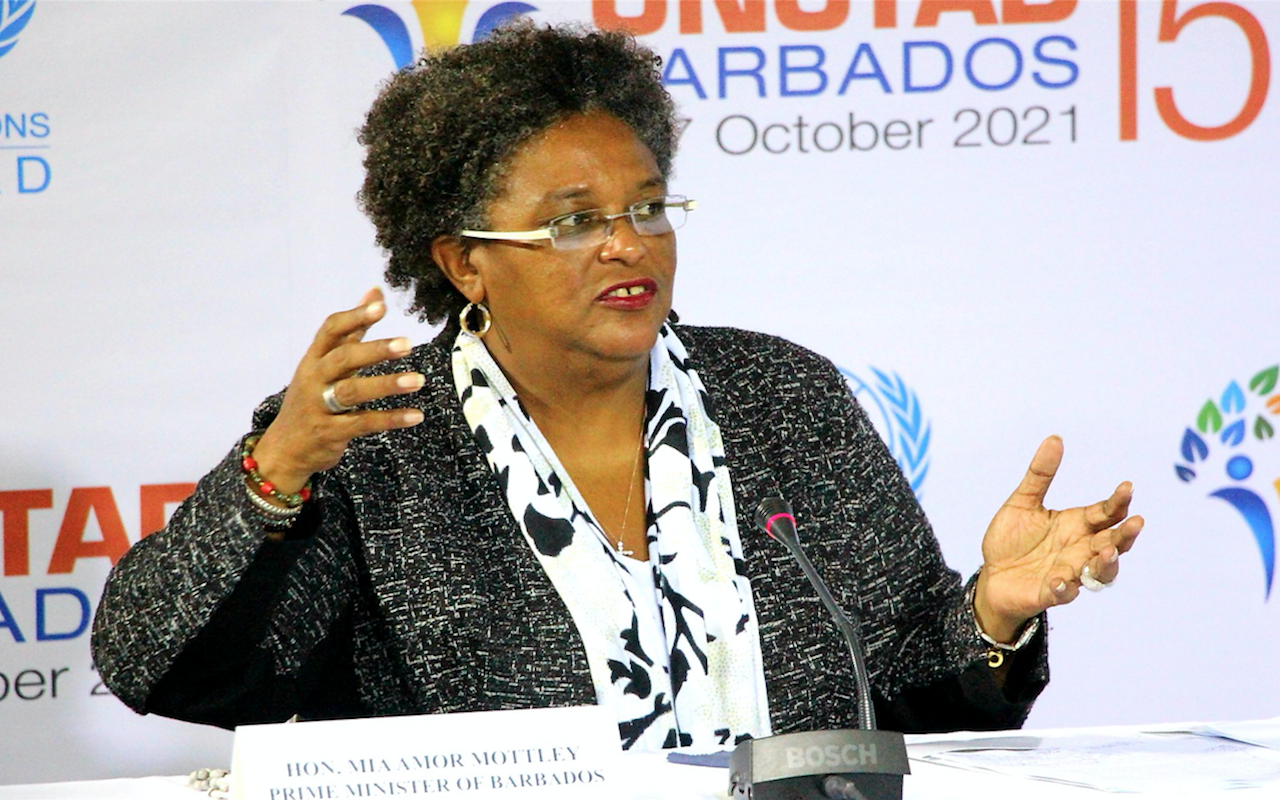A timeline of three years has been set for tangible results to be seen on a range of economic, social and environmental issues to be addressed coming out of the United Nations Conference on Trade and Development (UNCTAD 15) which ended here Thursday.
Prime Minister Mia Mottley, who is President of UNCTAD, and Secretary General of UNCTAD Rebeca Grynspan, gave the commitment during the closing press conference of UNCTAD-15.
Coming out of the five-day conference was the Bridgetown Covenant, an accord on global trade and development, and the Political Declaration, known as the Spirit of Speightstown, which were both adopted.
Mottley said the key issues that were high on the agenda to be addressed related to trade and logistics, investment, the creative industries and climate change.
“The first for sure is trade and logistics. The second will be on investment potentially, and the third one on the creative industries. We know that the Caribbean more than anything else is loaded with creativity, and if we are going to, as a small region in the world, get a return from it we have to be able to tell our stories in the multiple formats that can earn for us,” said Mottley.
Pointing out that a lot of trade was taking place over the internet, which was largely “privatized” and controlled by a small group of individuals and companies, Mottley said: “Just as the G20 countries are trying to deal with them by way of taxation, the reality is that we need to ensure there is fairness and that persons controlling the algorithms are not doing things you and I don’t understand.”
She said officials would also continue to “fight through UNCTAD” for more research.
Mottley said: “We need them to one, look at how we can deconstruct and reconstruct safe assets to ensure that the disparity and borrowing costs between the developing world and the developed world can be removed. [For example], why do Ghana and Greece have the same credit rating but Ghana borrows at a higher rate of interest than Greece?
“Largely because of Greece being in the European Union with the safe assets considered part and parcel of the reserve such that persons can reduce the risk and then they put a higher risk on the rest of us who do not have those safe assets,” she explained.
Coming out of UNCTAD15, officials would also be “looking at whether we can remove the rigidity that the macro economists have had with the whole question of debt to GDP ratio being at 60 per cent”, said the Prime Minister.
She added: “There is no way we can hold that while having to do what we have to do to adapt to a world that may go beyond 1.5 degrees. That is why we are asking as the Secretary General has asked, for there to be a commitment of 50 per cent of the $100 billion [climate fund goal] to be for adaptation and similarly for us to recognise too that it was no sense giving countries money if they don’t have the fiscal space to spend it. So in many instances, it may need to be grant funds as well.
“We also want to see work promoting a global clearing house for vaccines but also for other public goods that may come.”
Mottley, the current president of the UNCTAD conference, said she believed UNCTAD could help with advocacy to ensure greater equity in accessing public goods.
Food and nutrition security was also one of the agenda items.
“Those are some of the things and I hope that if we can achieve half of them in the next three years, I think we would have done exceptionally well and I am confident with the team that is the leadership of UNCTAD and with our commitment here that we will remain engaged to be able to report progress in three years’ time on the 60th anniversary,” said Mottley.
Grynspan agreed that developing countries needed more fiscal space so they could better invest in a number of areas including health care, youth development and education and welfare.
“So income is going down and expenditures are going up and we don’t have the financial resource to make the investments we need to make in youth, in education and in health, and those are very concrete things. So what we are trying to do is to not only make this problem visible but to go and propose very specific solutions for it,” said Grynspan. (MM)




